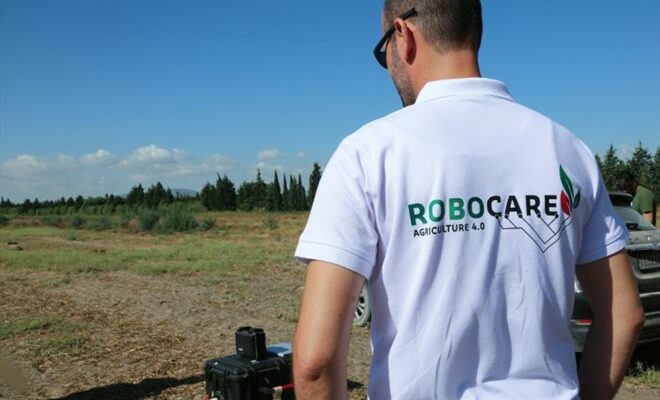Imen Hibri, founder of RoboCare, prepares to fly a drone over an agricultural field to scan trees and assess their hydration level or soil quality, on August 30, 2023 in Nabeul, Morocco (AFP /HASNA)
In a field of orange trees in Nabeul, the silence is broken by the whir of a drone. In Tunisia and elsewhere in the Maghreb, farmers are turning to high-tech to combat the effects of global warming.
Tunisia, Morocco, Algeria and Libya are among the world’s top 33 countries facing water stress which is worsening from year to year, according to the American World Resources Institute.
“Using modern technologies in agriculture has become inevitable” to reduce costs and crop losses, explains to AFP Imen Hbiri, 35, founder of RoboCare, which employs around ten people.

A drone from the startup Robocare flies over an agricultural field to scan trees and assess their hydration level or soil quality, on August 30, 2023 in Nabeul, Morocco (AFP/HASNA)
The black V-shaped machine zigzags above the citrus plants – a specialty of the Nabeul region (east) – scanning the 15 hectares with cameras and sensors.
The data collected allows RoboCare to analyze the hydration level of a particular plot, the quality of the soil and even the condition of the crops to detect diseases.
Then, the farmer can intervene with pesticide spraying or targeted watering on the suffering plantations.
– Green, blue and red –
In a few clicks, Imen Hbiri accesses the irrigation and vegetation indicators of each zone, and their state of health, according to a range of colors (red, green, blue) more or less pronounced.

Farmer Yassine Gargouri, who used the services of the startup RoboCare, inspects his citrus plantation on August 30, 2023 in Nabeul, Morocco (AFP/HASNA)
“The farmer can obtain up to 30% water savings, increase his yields by 30% and reduce his expenses by 20% thanks to this technology,” underlines the CEO of RoboCare, herself the daughter of farmers.
Tunisia is going through its fourth consecutive year of drought, according to the Ministry of Agriculture. The dams, the main source of drinking water and for irrigation, are filled to only 22% of their capacity and 20 reservoirs are out of use due to lack of rain.
Yassine Gargouri used the services of RoboCare in order to reduce his costs, while he devotes 80% of his expenses to the purchase of fertilizers and fertilizers.
“We no longer have the seasons before where we knew exactly what to do,” explains Mr. Gargouri, noting that in May the temperatures are now high and that in August, it can rain, favoring diseases. , when formerly the weather was dry and hot.
“We have to adapt to these upheavals, it’s really the challenge of tomorrow,” he adds.
Drones and high-tech are for him “an additional step”, after the arrival of drip irrigation around twenty years ago in the face of decreasing rainfall. And new technologies make it possible to “optimize what we put on the leaves as phytosanitary products and therefore their cost”.

A technician from the RoboCare startup prepares to fly a drone over an agricultural field to scan trees and assess their hydration level or soil quality, on August 30, 2023 in Nabeul, Morocco (AFP/ HASNA)
In neighboring countries, the situation is similar. In Morocco, agriculture is a key sector, representing 13% of GDP, 14% of exports and 33% of jobs.
But only 3% of the two million farmers use technologies, according to Loubna El Mansouri, director of the digital center at the Ministry of Agriculture, in a country which in 2022 suffered its worst drought in 40 years.
– “Great water savings” –
“With an irrigation drone, we consume less than 20 liters of water to irrigate one hectare compared to nearly 300 liters” with conventional techniques, explains Ms. El Mansouri. “So there is a big saving in water.”
Driven by similar objectives, the Ministry of Agriculture in Algeria intends to develop the use of drones and satellite images.

A technician from the RoboCare startup prepares to fly a drone over an agricultural field to scan trees and assess their hydration level or soil quality, on August 30, 2023 in Nabeul, Morocco (AFP/ HASNA)
The authorities are preparing, according to official declarations, “a national map of production sites and capacities” in order to “optimize the use of agricultural land”.
The generalization of new technologies in agriculture in North Africa, however, requires adapting the legal framework of these countries and raising awareness among farmers and administrations.
In Tunisia, Ms. Hbiri hopes that the authorities will facilitate their use while “only 10% of farmers currently use them”.
According to her, “the administrative side should be more fluid”, in particular for the granting of authorizations for overflights by drones which often takes months.
In Tunisia, just as in Algeria and Morocco, the use of drones is closely monitored and prohibited in certain portions of the territory for security reasons.
“We want to focus on technology rather than investing time and effort going back and forth to offices and banks, which hinders our development,” emphasizes Ms. Hbiri.
bur-ayj-bou-fka/ezz/ila
© 2023 AFP
Did you like this article ? Share it with your friends using the buttons below.




